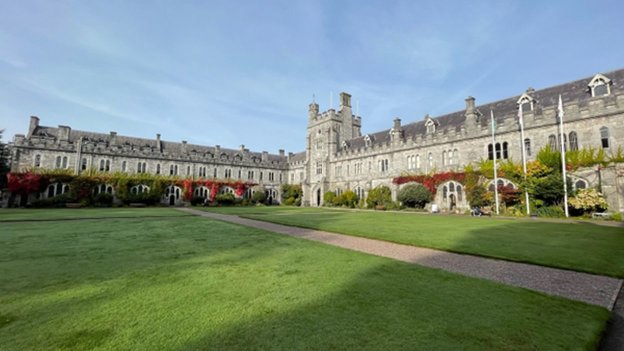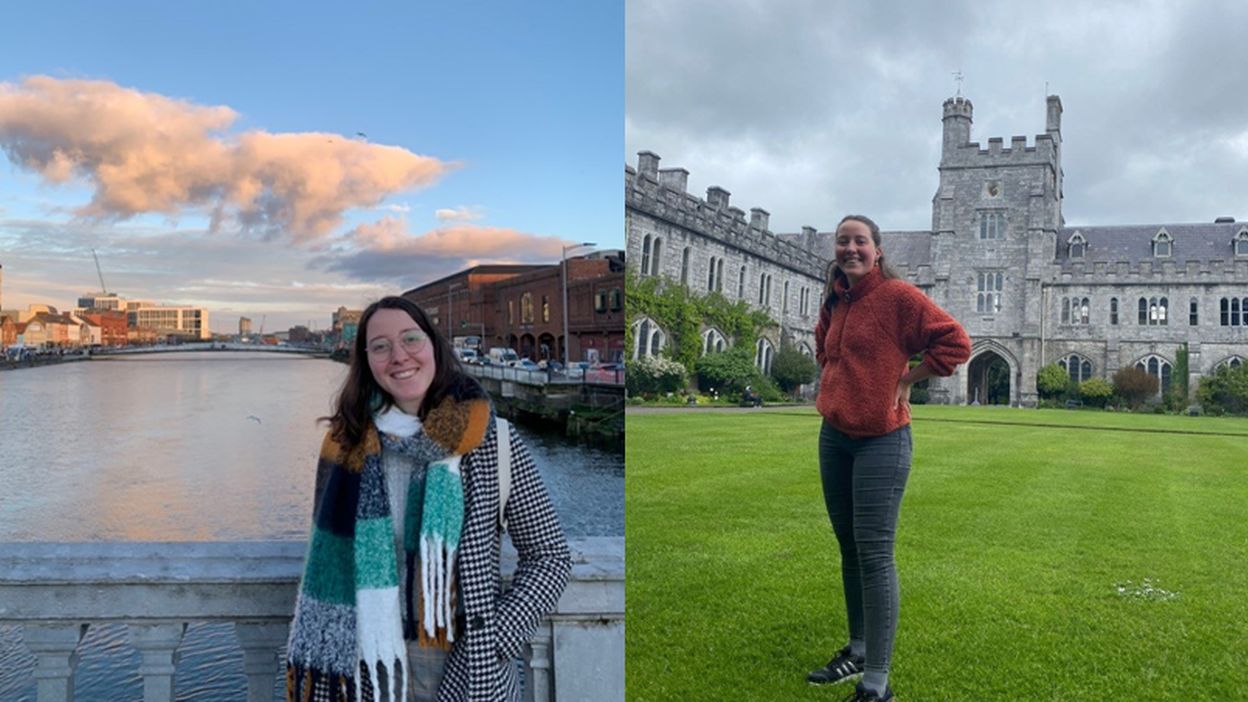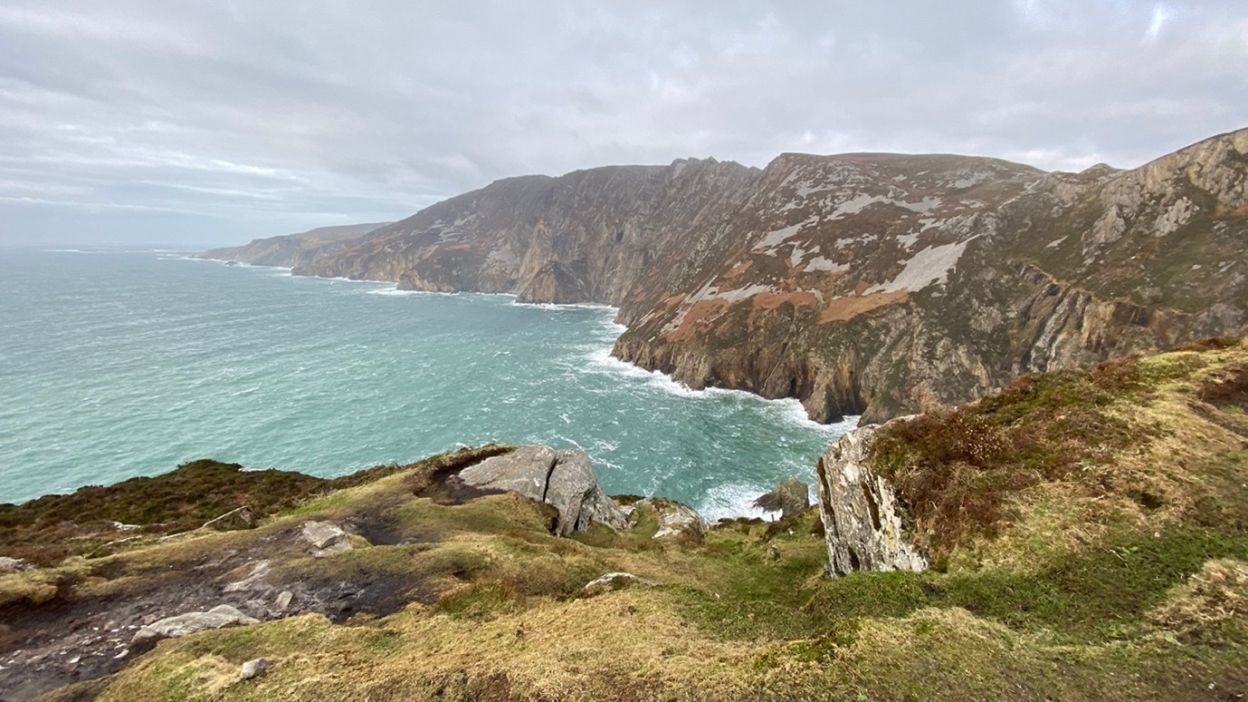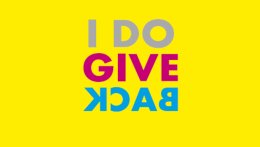Leonie Eberhardt
 Privat
Privat
The central main building of the University College Cork
"What I’ll take away from my time at UCC are the many wonderful experiences, my ongoing friendships and the certainty that I will return to Cork."
Leonie Eberhardt ventured from her student city of Munich to the rather smaller Irish city of Cork for a year, where she was able to gain a variety of new academic and personal experiences. This was made possible for her by an Alexander Spohn Foundation scholarship through the DAAD-Stiftung.
Here, she talks about her time in Cork:
As a way of putting my bachelor’s degree course in Geography into an even more diverse context than was already the case, it was very important for me to spend part of it abroad. Thanks to financial support from the Alexander Spohn Foundation in cooperation with the DAAD-Stiftung, I had the opportunity to spend my fifth and sixth semesters at University College, Cork and explore the ‘Emerald Isle’ of Ireland.
Cork is a small city with a population of around 200,000 – a striking contrast to Munich, where I go to university. Nevertheless, I had no trouble settling into my new town, and I soon found my feet. University College Cork is one of two large universities in the city and its expansive campus in the heart of the city clearly highlights the role of students there, as they make up just under 25% of the population.
By choosing to stay in Ireland I deliberately challenged myself to study in a country whose many different dialects of English are often considered incomprehensible. That even applies to the Irish themselves, who often have trouble communicating with Irish people from different counties. That said, living in Cork with five Irish guys and one girl from England, I quickly got used to the different dialects and linguistic quirks. However, Ireland has a second official language alongside English: Irish, which Germans often refer to as ‘Gaelic’. Unfortunately, the Irish language is becoming less and less widespread on the Emerald Isle, but it is kept alive through the constant efforts of many members of the public. Along with other international students, I got to know the basics of this ancient language on a language course at UCC. This and other courses on Irish history and culture gave me an incredibly valuable insight into Irish culture.
UCC offers a very wide range of courses. I took a varied selection of the courses listed above, along with criminology in connection with urban development and diversity in urban geography, urban planning and sustainable development. In contrast to the forms of assessment employed at my home university, in Cork they almost exclusively require essays. For me this was a fantastic and instructive opportunity to delve more deeply into the course content on one particular issue, working independently to read around the contents of the lectures and seminars, and developing my own academic work.

Privat
left: The River Lee in Cork City; right: The lawn of the "Quad" on UCC Campus, which can only be stepped on after finishing your studies
In terms of working methods, I was able to gain some experience and practical knowledge in physical and human geography that had not been possible at my home university due to the pandemic. Using practical experience to supplement theoretical knowledge is a fundamental element of studying Geography, and I was able to significantly expand on this during my stay abroad. Overall, many courses thrived on interactions in the ‘field’ – for geographers, this means anything that isn’t the lecture theatre, such as moorland, shopping centres and residential areas. We often observed the theoretical content of our course in practice on field walks.
The seminars were much more interactive than I was used to in Germany, thriving on the dialogue between students and lecturers. Experts were regularly invited to give us a deeper insight into how the content of almost all my courses was implemented in practice. My courses also complemented each other really well. For example, in one course we studied how Irish history from past centuries had influenced Cork’s development as a city up to the present day. On another course, I learned about concepts of sustainable spatial planning through specific examples, as well as studying the implications of sustainability in connection with land management.
One course that really took me out of my comfort zone in geography was a criminology module on ‘crime, urbanisation and cities’. This was a rather unusual field, not only for me but also for the Irish criminology and sociology students. Yet the different approaches taken by these disciplines complemented each other brilliantly and created exciting points of consensus. In one essay I explored planning measures such as creating residential areas with dead-end streets and few through roads, thereby increasing social control. My essay considered how these could potentially influence trends in crime in the context of muggings. Returning to material that was rather closer to my normal studies in another module, I explored urban coexistence in social geography and inclusion and exclusion based on factors such as physical and mental disabilities, gender, ethnicity, religion and (hyper) sensitivity. Overall, I was able to take away a huge amount of input which will open up previously unknown possibilities when it comes to choosing my bachelor’s thesis or my master´s degree course. For my further studies, I have acquired many experiences from outside my subject and interdisciplinary knowledge from many niche areas of Geography. These will influence me in my future academic career.
One of the experiences that had a very profound effect on me was visiting Gaeltacht na nDéise in County Waterford as part of my course. A Gaeltacht is a district where the Irish language continues to be used as the everyday language, and it is even used as the language for teaching in a boarding school in the small village of An Rinn. I spent four days at this boarding school along with a small group of around 15 international students. We got to experience traditional Irish music, dance, language and sport such as hurling, Ireland’s national sport. Thanks to these invaluable experiences in particular I feel a much deeper connection to Ireland and I have come to love the country and its people.

Privat
The 600 metre high cliffs of Sliabh Liag
The Irish university system is very similar to the British system, with student life closely bound up with the university and many opportunities to take up activities outside the academic sphere. A ‘Clubs and Societies Day’ is held at the beginning of each semester, presenting the huge range of sporting and social activities. I volunteered on the committee of the International Development Society, where I gained many interesting ideas for my studies through talks and group projects. The Environmental Society organised many events in the city such as litter picking and planting campaigns in the UCC community garden. Here it was easy to meet new friends and strengthen friendships. In terms of sport, I also had the chance to take up kayaking as a new hobby and to go on many great hikes all across southern Ireland with the Mountaineering Club.
Just as when working with others in my various university courses, it was in these situations that I made friends with Irish students. However, my circle of friends was otherwise characterised by a colourful mix of the most diverse nationalities. Sharing our cultures opened my eyes to many social and political issues and showed me different perspectives from all over the world. For example, we went to the pub together and danced to traditional Irish music, something which is still a very common pastime for many Irish people. We visited museums and old ruined castles and went on cycling tours, even going swimming in winter at 0°C and we took trips all over Ireland.
Although Ireland has a dreadful railway network, it does have good long-distance bus routes which allow you to explore most parts of the country, so we went on many weekend excursions. The landscape of the southern counties alone is incentive enough to spend several months here. Nevertheless, we didn’t overlook the rest of the country, from the west coast with Galway and the Connemara area through to Sligo and Donegal in the far north, along with the interior of the country and the ‘Ancient East’. After submitting my academic work at the end of the second semester, I even had the chance to go on a week-long bus and ferry tour of Scotland and Wales with family and friends from Germany.
I had an incredible time on my stay abroad, and I wouldn’t have missed it for anything! I took the ‘rebel city’ of Cork to heart from the very first moment, which made it hard to leave it behind just less than six months later. What I’ll take away from my time at UCC are the many wonderful experiences, my ongoing friendships and the certainty that I will return to Cork. I would like to say a heartfelt ‘thank you’ to the Alexander Spohn Foundation and the DAAD-Stiftung for their fantastic support and scholarship funding. My stay abroad wouldn’t have been possible without it!
As of December 2022. The German version is the original.


